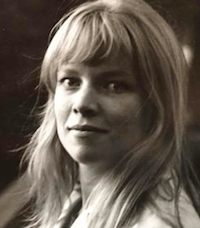Sally Belfrage
Sally Belfrage (October 4, 1936 – March 14, 1994) was a United States-born British-based 20th century non-fiction writer and international journalist.[1][2] Her writing covered turmoils in Northern Ireland, the American Civil Rights Movement and her own memoirs about her life.[1] According to her obituary in The New York Times, she was 'an intelligent and humorous journalist and critic who ardently searched for the truth'.[3]

Life
Sally Mary Caroline Belfrage was born in Hollywood, California, on 4 October 1936.[2] Her parents, Cedric Belfrage and Molly Castle, later moved to New York where Sally studied at the Bronx High School of Science and Hunter College,[2] before her parents were deported to London as alleged Communists.[1][2] After her return to England, Sally Belfrage matriculated at the London School of Economics,[1][2] and after graduation worked for the Foreign Languages Publishing House, Moscow, in 1957.[2]
Belfrage became a social activist and world traveller.[1] Her books include The Crack: A Belfast Year (retitled Living with War: A Belfast Year for United States distribution),[4] Un-American Activities: A Memoir of the Fifties,[5] Freedom Summer,[6] A Room in Moscow,[7] and Flowers of Emptiness: Reflections on an Ashram.[3] In 1969, Belfrage signed a war tax resistance vow, along with 447 other American writers and editors. It was published in the January 30, 1969 edition of the New York Post.[1]
In 1965, she married Bernard Pomerance who was best known for his play, The Elephant Man.[8] They had two children: Eve Pomerance, a casting director in Hollywood, and Moby Pomerance, a playwright.[1][9][10] Sally Belfrage lived most of her life in London, where she died at Middlesex Hospital from lung cancer (adenocarcinoma) in 1994 at age 57.[2][11] Her brother was Nicolas Belfrage, the wine critic.[12] Her father's brother was Bruce Belfrage, the BBC Newsreader during World War II, and her great uncle was Bryan Powley, the actor.[13]
References
- "Obituary: Sally Belfrage". The Independent. 16 March 1994. Retrieved 21 June 2019.
- Pace, Eric (15 March 1994). "Sally Belfrage Dies; Writer Specializing In Memoirs Was 57". Retrieved 22 June 2019 – via NYTimes.com.
- Belfrage, Sally (22 June 1982). "Flowers of emptiness". Women's Press. Retrieved 22 June 2019 – via Open WorldCat.
- Belfrage, Sally (22 June 1987). "Living in war: a Belfast year". Viking. Retrieved 22 June 2019 – via Open WorldCat.
- Belfrage, Sally (22 June 1995). "Un-American activities: a memoir of the fifties". HarperPerennial. Retrieved 22 June 2019 – via Open WorldCat.
- Belfrage, Sally (22 June 1999). "Freedom summer". University Press of Virginia. Retrieved 22 June 2019 – via Open WorldCat.
- Belfrage, Sally (22 June 1966). "A room in Moscow". Mayflower-Dell Paperback. Retrieved 22 June 2019 – via Open WorldCat.
- "Sally Belfrage, American-born Journalist, Dies at 57". AP NEWS. Retrieved 22 June 2019.
- "Resume - eve pomerance casting". evepomerancecasting. Retrieved 22 June 2019.
- "An Interview with Moby Pomerance". 19 July 2010. Retrieved 22 June 2019.
- Guide to the Sally Belfrage papers Archived 2006-09-05 at the Wayback Machine
- http://downloads.bbc.co.uk/radio4/Nicolas-Belfrage-statement.pdf
- "Ancestry® - Genealogy, Family Trees & Family History Records". www.ancestry.co.uk. Retrieved 22 June 2019.